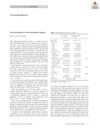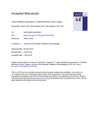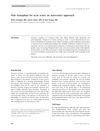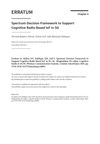 3 citations,
August 2019 in “Journal of The American Academy of Dermatology”
3 citations,
August 2019 in “Journal of The American Academy of Dermatology” Higher doses of spironolactone may improve acne in PCOS patients, but side effects are a concern.
 3 citations,
January 2018 in “Postępy Dermatologii i Alergologii”
3 citations,
January 2018 in “Postępy Dermatologii i Alergologii” Longer TA repeats in the SRD5A2 gene may increase acne risk in Chinese people.
[object Object] 3 citations,
May 2007 in “Clinical and Experimental Dermatology” Hair does not prevent acne.
 2 citations,
August 2021 in “Australasian Journal of Dermatology”
2 citations,
August 2021 in “Australasian Journal of Dermatology” Acne in adult women is often linked to polycystic ovary syndrome, especially in those who are younger, have premenstrual acne flare-ups, and irregular periods.
 2 citations,
November 2018 in “Clinical and Experimental Dermatology”
2 citations,
November 2018 in “Clinical and Experimental Dermatology” Acne is more common in men with male pattern baldness due to increased hormone levels.
2 citations,
January 2018 in “Elsevier eBooks” Probiotics and dietary changes can help treat acne.
 2 citations,
September 2016 in “Journal of skin and stem cell”
2 citations,
September 2016 in “Journal of skin and stem cell” Acne is strongly linked to high BMI, hair loss, menstrual issues, family history, and eating too many sweets and fatty foods, but not to excessive hair growth.
 2 citations,
January 2014 in “Springer eBooks”
2 citations,
January 2014 in “Springer eBooks” Polycystic Ovary Syndrome (PCOS) often leads to severe acne, and lifestyle changes and hormonal treatments can help manage it.
 2 citations,
July 2008 in “Paediatrics & child health”
2 citations,
July 2008 in “Paediatrics & child health” Severe acne in a young girl may indicate underlying hormonal issues.
 2 citations,
January 2002 in “The Journal of Korean Medicine Ophthalmology and Otolaryngology and Dermatology”
2 citations,
January 2002 in “The Journal of Korean Medicine Ophthalmology and Otolaryngology and Dermatology” Sophora flavescens extract helps hair grow and prevents acne.
2 citations,
May 1984 in “Current Problems in Pediatrics” Pediatricians can effectively treat most acne cases with the right knowledge and patient involvement.
2 citations,
December 2019 in “Colombia medica” A patient with a rare scalp condition showed improvement with isotretinoin and other medications.
 2 citations,
May 2019 in “Journal of the American Academy of Dermatology”
2 citations,
May 2019 in “Journal of the American Academy of Dermatology” Facial hidradenitis suppurativa can be mistaken for acne but requires different treatment.
2 citations,
January 2013 Metformin improves acne, hair growth, and menstrual cycles in females with PCOS.
 2 citations,
June 2012 in “Journal of Cosmetic Dermatology”
2 citations,
June 2012 in “Journal of Cosmetic Dermatology” Hair transplant using beard hair made acne scars on cheeks less visible with minimal scarring in the donor area.
 1 citations,
January 2023 in “Journal of cosmetic dermatology”
1 citations,
January 2023 in “Journal of cosmetic dermatology” Combining CO2 laser with platelet-rich plasma is more effective for treating acne scars than laser alone.
 1 citations,
April 2021 in “International Journal of Dermatology”
1 citations,
April 2021 in “International Journal of Dermatology” Women with conditions like PCOS may have a higher risk of COVID-19, but treatments like isotretinoin could help those with acne.
[object Object]  1 citations,
May 2020 in “Reproductive Endocrinology”
1 citations,
May 2020 in “Reproductive Endocrinology” The document concludes that hair loss and acne in women can be due to both androgen-related and unrelated causes, requiring a collaborative treatment approach.
 1 citations,
April 2019 in “Journal of Investigative Dermatology”
1 citations,
April 2019 in “Journal of Investigative Dermatology” VB1953 gel significantly reduced acne and resistant bacteria in patients who didn't respond to clindamycin.
 1 citations,
November 2013 in “Pediatrics in Review”
1 citations,
November 2013 in “Pediatrics in Review” Effective acne treatment and patient education are crucial to prevent long-term physical and psychological effects.
 1 citations,
August 2013 in “Springer eBooks”
1 citations,
August 2013 in “Springer eBooks” Birth control pills and anti-androgen medications help manage hair growth, acne, and hair loss in women with PCOS.
 1 citations,
January 1989 in “Journal of dermatological treatment”
1 citations,
January 1989 in “Journal of dermatological treatment” Azelaic acid may help treat acne by killing bacteria, reducing inflammation, and preventing clogged pores.
1 citations,
December 1978 in “British journal of dermatology/British journal of dermatology, Supplement” Hormonal imbalances in congenital adrenal hyperplasia cause acne.
 1 citations,
August 2023 in “Clinical, Cosmetic and Investigational Dermatology”
1 citations,
August 2023 in “Clinical, Cosmetic and Investigational Dermatology” A condition with certain scalp changes may come before acne keloidalis nuchae and other similar hair loss disorders.
 1 citations,
March 2022 in “Cureus”
1 citations,
March 2022 in “Cureus” A woman with lupus and systemic sclerosis developed severe acne that didn't improve with treatment and died from pneumonia and septic shock.
 1 citations,
October 2021 in “Benha Journal of Applied Sciences”
1 citations,
October 2021 in “Benha Journal of Applied Sciences” People with acne have a different balance of certain antioxidants in their blood compared to healthy individuals.
1 citations,
January 2021 in “Journal of dermatology & dermatologic surgery” Oral isotretinoin does not cause milia in acne patients.
 1 citations,
March 2017 in “InTech eBooks”
1 citations,
March 2017 in “InTech eBooks”  1 citations,
December 2011 in “Journal of The American Academy of Dermatology”
1 citations,
December 2011 in “Journal of The American Academy of Dermatology” The book concludes that treating acne scars requires a variety of methods and patience, with no single best way to classify or treat them.
 October 2024 in “Tikrit Journal of Pure Science”
October 2024 in “Tikrit Journal of Pure Science” High Geh gene expression in Staphylococcus aureus contributes to acne.























